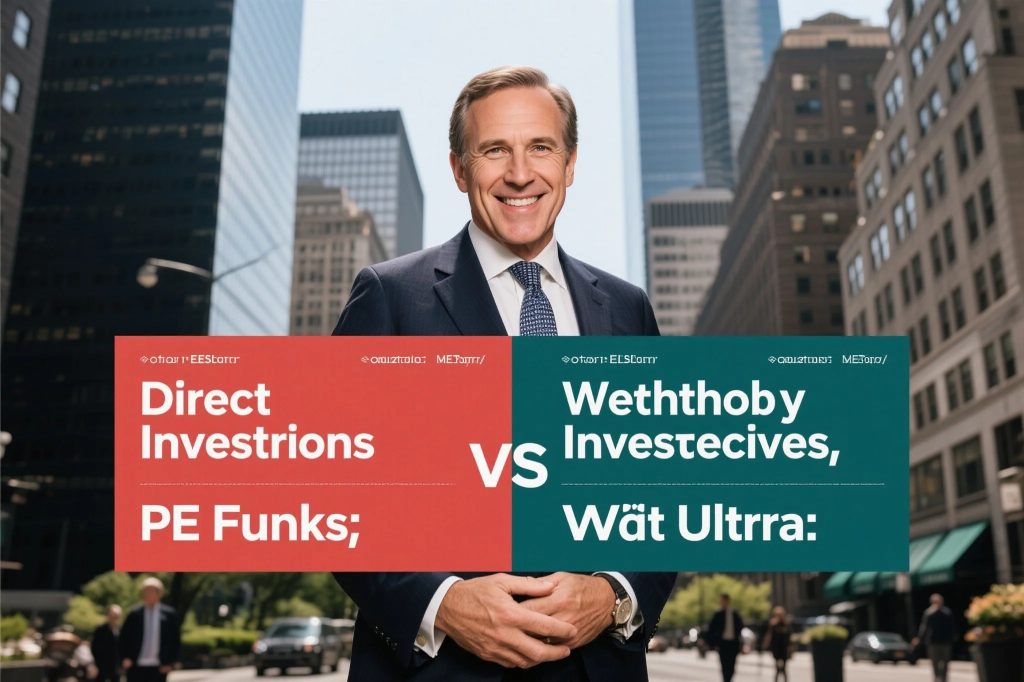
the great debate in ultra-high-net-worth portfolios
Among UHNW investors with $50 million or more in liquid assets, the allocation between direct investments and private equity funds has become one of the most hotly contested portfolio decisions. This tension reflects fundamental differences in philosophy about risk, control, and value creation. On one side stand the institutionalists who prefer the diversification and professional management of established PE funds. On the other, the entrepreneurial investors who crave hands-on involvement and dislike paying management fees for what they see as passive exposure. The truth, as with most investment debates, lies somewhere in between – with sophisticated families increasingly blending both approaches to optimize their overall wealth management strategy.
The appeal of direct investments for UHNW investors stems from several key advantages. First is the elimination of the “double fee” structure common in private equity funds, where investors pay both management fees and carried interest. Second is the ability to conduct truly customized due diligence rather than relying on a fund manager’s assessment. Perhaps most importantly, direct deals offer complete investment control – the ability to influence operational decisions, hold assets indefinitely, and structure exits on one’s own timeline. These benefits come with substantial operational burdens, but for certain types of investors, the tradeoff proves worthwhile.
the case for private equity funds in UHNW portfolios
Despite the allure of direct investments, private equity funds continue to command the lion’s share of ultra-wealthy capital for good reason. The best funds offer access to proprietary deal flow that even well-connected UHNW investors couldn’t replicate individually. They provide professional management teams with deep sector expertise and proven value-creation playbooks. Perhaps most importantly in today’s complex environment, they offer diversification across geographies, industries, and vintage years – a critical component of sophisticated wealth management that’s difficult to achieve through direct deals alone.
The operational advantages of funds shouldn’t be underestimated. While investment control is more limited, so too is the administrative burden. Fund investors avoid the need to build in-house deal teams or manage portfolio company relationships. They benefit from institutional-quality reporting and compliance infrastructure. For families whose wealth stems from operating businesses rather than financial acumen, these professional management features often outweigh the theoretical advantages of going direct. The key is selecting funds that align with the family’s overall objectives rather than simply chasing top-quartile performers.
hybrid approaches gaining traction
Increasingly, sophisticated UHNW investors are rejecting the binary choice between direct investments and private equity funds, instead crafting hybrid strategies that capture the best of both worlds. One popular approach involves using funds for core exposure while making selective co-investments alongside trusted managers. This provides the diversification benefits of funds while reducing overall fee drag and allowing for greater investment control over certain high-conviction positions. Families implementing this strategy typically allocate 60-70% to funds and 30-40% to direct opportunities.
Another emerging model involves building dedicated “family investment platforms” that blend elements of traditional wealth management with direct investing capabilities. These platforms typically employ a small team of investment professionals who source and manage direct deals while also overseeing relationships with top-tier fund managers. The most sophisticated versions incorporate shared analytics and due diligence resources across both channels, creating synergies that enhance overall portfolio performance. For families with $500 million or more in assets, this approach can provide the scale needed to compete effectively with institutional investors.

deal sourcing and due diligence challenges
For UHNW investors pursuing direct investments, the single greatest challenge remains accessing quality deal flow. Unlike private equity funds that benefit from decades of institutional relationships, individuals must build their networks from scratch. The most successful direct investors typically leverage industry-specific connections from their operating backgrounds or partner with family offices that have established deal funnels. Some participate in exclusive peer networks like YPO or Tiger 21 to gain access to off-market opportunities. Regardless of the approach, developing a consistent pipeline requires significant time investment that many wealthy families underestimate.
The due diligence burden presents another formidable hurdle. While fund investors can rely on professional teams to conduct technical, financial, and legal analysis, direct investors must either build these capabilities internally or engage expensive third-party consultants. This challenge becomes particularly acute in specialized sectors like healthcare or technology, where understanding regulatory pathways or intellectual property landscapes requires niche expertise. Many families attempting direct investment control find they need to hire at least one full-time investment professional for every $200-300 million allocated to direct deals – a cost that erodes some of the theoretical fee savings.
performance comparison and benchmarking
Comparing the performance of direct investments versus private equity funds in UHNW investors portfolios reveals several counterintuitive findings. While top-performing direct deals often outperform fund returns by wide margins, the dispersion of outcomes is significantly wider. Family offices with operating backgrounds in specific industries tend to achieve better direct investment results than those coming purely from financial backgrounds. Interestingly, the average performance of direct deals across ultra-wealthy portfolios roughly matches that of mid-tier PE funds – suggesting that while some families add genuine value, others would be better served sticking with professionals.
Benchmarking presents unique challenges for direct investors. Unlike fund investments that can be measured against industry-standard indices, direct deals require custom benchmarks that account for sector, geography, and deal size. Sophisticated wealth management teams now develop bespoke benchmarks for each direct investment, often blending public market comparables with relevant private market data. This level of analysis is resource-intensive but essential for proper performance attribution and portfolio construction decisions. The most successful families treat their direct investment programs with the same rigor as institutional investors, complete with formal investment committees and documented decision-making processes.
tax and estate planning considerations
The choice between direct investments and private equity funds carries significant implications for UHNW investors‘ tax and estate planning strategies. Direct investments offer more flexibility in structuring transactions for tax efficiency, particularly when using trusts or family investment vehicles. They allow for customized timing of taxable events and greater control over the character of income (ordinary vs. capital gains). These advantages can translate into substantial after-tax return differentials compared to fund investments, where tax outcomes are largely at the manager’s discretion.
However, the illiquidity of direct positions creates estate planning challenges that funds don’t face. It’s far easier to gift or bequeath fund interests than direct ownership stakes in operating companies, particularly when those stakes represent control positions. Many families pursuing direct investment control find they need to establish complex holding structures upfront to facilitate future wealth transfers. These structures often involve layered LLCs, voting/non-voting share classes, and specialized trust arrangements – all of which add complexity to what might otherwise be straightforward wealth management plans.
the control paradox in family investing
The desire for investment control that drives many UHNW investors toward direct investments often creates unexpected challenges. Families accustomed to controlling their operating businesses frequently struggle with the realities of minority positions in direct deals. Even when taking control positions, they often underestimate the time requirements of active ownership. The result is what some wealth advisors call the “control paradox” – families sacrifice diversification to gain control, only to find they lack the bandwidth or expertise to exercise that control effectively.
This paradox explains why many successful business families ultimately gravitate toward private equity funds for the bulk of their allocations, reserving direct investments for areas where they have genuine competitive advantage. The most sophisticated approach recognizes that control exists on a spectrum – it might mean board seats rather than majority ownership, or concentrated sector bets through sector-specific funds rather than pure direct deals. In wealth management as in business, the most successful families are those that match their organizational capabilities with their strategic ambitions.
building the right team for direct investing
For UHNW investors committed to substantial direct investment programs, assembling the right team proves just as critical as selecting the right deals. Unlike private equity funds where the investment team comes pre-packaged, direct investors must build their own capabilities from scratch. The most effective teams typically blend investment professionals with operating executives – former CEOs or functional leaders who can properly evaluate business plans and management teams. Many families make the mistake of hiring only finance professionals, only to find they lack the operational perspective needed for true investment control.
Compensation structures present another challenge. Talented investment professionals command premium salaries, particularly those with both Wall Street and operating experience. Families must decide whether to pay market-rate compensation (eroding some of the fee advantage over funds) or attempt to use equity participation as the primary incentive. In practice, the most successful direct investment programs adopt compensation models that blend both approaches, often with long-term vesting schedules to ensure alignment. Regardless of the specific structure, building an effective team requires acknowledging that quality talent doesn’t come cheap – a reality that many wealthy families initially resist.
the future of UHNW private investing
As the population of UHNW investors grows globally, the competition for quality direct investments and access to top private equity funds will only intensify. This dynamic is already driving several notable trends in ultra-wealthy wealth management. First is the rise of “club deals” where families pool resources to compete for larger transactions. Second is the growing professionalization of family offices, with many now rivaling institutional investors in their capabilities. Third is the emergence of hybrid fund structures that offer families preferential terms in exchange for anchor commitments.
The most successful investors will likely be those who maintain flexibility in their approach – using funds where appropriate while reserving bandwidth for truly exceptional direct opportunities. They’ll recognize that investment control matters most in situations where they can add unique value, not as an end in itself. Perhaps most importantly, they’ll understand that building a world-class private investment portfolio requires the same level of strategic planning and execution excellence as building a world-class operating business – a lesson that separates the merely wealthy from the genuinely sophisticated.